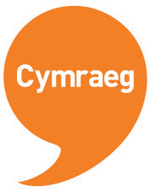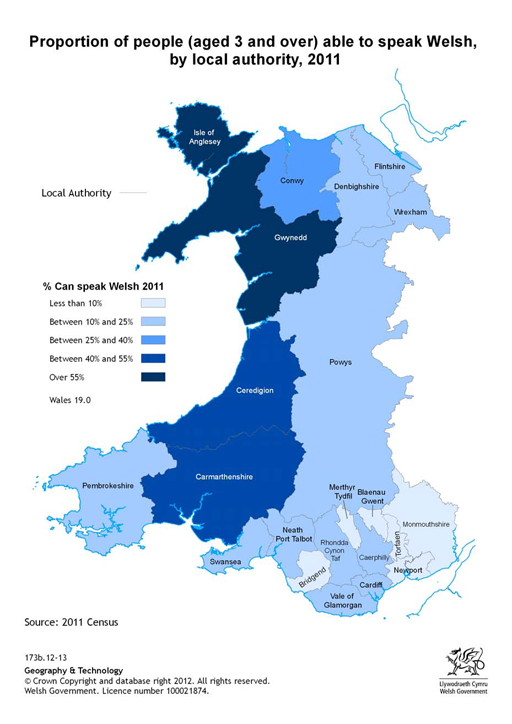5 Social work and the Welsh language

Language can be a further aspect of disadvantage and a source of discrimination for service users and carers.
A growing variety of languages can be heard across Wales, and social workers need to be alert to the needs of service users who speak English as an additional language (or indeed speak no English at all), as well as to the needs of service users and carers who are Welsh speaking. Since 2010 (which saw the introduction of the Welsh Language (Wales) Measure, Wales has had two official languages (Welsh and English), a fact that provides an additional challenge to the social work profession.
Activity 9: Who speaks Welsh?
At the moment, about 19% of the population in Wales speak Welsh, which equates to 562,016 people. Look at the map (Figure 8) and Table 1 below, showing the distribution of Welsh speakers across Wales, and language use by age (comparing 2011 with 2001 census data) respectively. Consider the questions below.
What is the proportion of Welsh speakers in the area in which you live and/or work?
How does this compare with what you thought in Activity 1?
How do services in your area provide for Welsh speakers?
How might this kind of information affect a social worker’s practice?

| 2001 | 2011 | Difference | ||
|---|---|---|---|---|
| 3 – 4 oed | 13,239 (18.8%) | 16,495 (23.3%) | 3,256 (4.6%) | 3 – 4 yrs |
| 5 – 15 oed | 171,168 (40.8%) | 152,255 (40.3%) | -18,913 (-0.5%) | 5 – 15 yrs |
| 16 – 19 oed | 40,548 (27.6%) | 43,651 (27%) | 3,103 (-0.7%) | 16 – 19 yrs |
| 20 – 44 oed | 146,227 (15.5%) | 150,742 (15.6%) | 4,515 (0)%) | 20 – 24 yrs |
| 45 – 64 oed | 112,742 (15.6%) | 107,941 (13.3%) | -4,801 (-2.3%) | 45 – 64 yrs |
| 65 – 74 oed | 47,692 (18.1%) | 45,112 (15.0%) | -2,580 (-3%) | 65 – 74 yrs |
| 75 oed+ | 50,752 (21.1%) | 45,820 (17.5%) | -4,932 (-1.7) | 75 yrs + |
| Pob oed | 582,368 (20.8%) | 562,016 (19%) | -20,352 (-1.7%) | All ages |
Discussion
The number and proportion of Welsh speakers in Wales in 2011 was less than in the previous census (2001), when 20.8% of the population identified as Welsh speaking. The drop is largely due to demographic changes, migration (both inward and outward), and changes in people’s language skills (National Statistics for Wales, 2012). The 2011 census does, however, show a sharp rise in the proportion of young children able to speak the language, and a slight rise in the proportion of adults aged 20–44. Welsh speakers among other age groups of children and young people have not changed much, and there continue to be more older people speaking the language than in other age groups (although this is declining).
This may have implications for children and family services, as they work with increasing numbers of school age children who are Welsh speaking. Mental health services and older people’s services, too, will need to be mindful of language need. This requirement is also embedded in the relevant legislation and policy related to each service user group in Wales.
Evidence suggests that bilingual people may present themselves differently depending on which language they are using (Altarriba and Morrier, 2004, in Davies, 2009), and that they are better able to relate experiences in the language in which they occurred. Furthermore, bilingual people may draw on the word or words that most clearly express what they are trying to say, from either of their languages, or they may use their second language to provide some distance from matters that may be difficult to discuss. Linguistic preference is a complex issue and one that requires a sensitive approach.
Children attending Welsh medium education, for example, in most of Wales are likely to be bilingual, and may come from English-speaking or bilingual homes. They may therefore speak one language at school and either or both at home. It would be important for the social worker to be sensitive as to how, when and with whom the various family members might want to use Welsh and/or English, and how this might be facilitated. As well as being sensitive to language need, they would also need to know that Welsh and English should be treated on the basis of equality (Welsh Language Act, 1993), and would need to implement the ‘active offer’ principle (Welsh Government 2012), ensuring that they identify language need and choice for service users and carers in their everyday practice. This principle removes the responsibility for requesting a service in Welsh from the service user or carer, who may already be in a position of low status and power, and therefore may not feel able to make this request.
